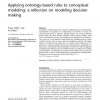Free Online Productivity Tools
i2Speak
i2Symbol
i2OCR
iTex2Img
iWeb2Print
iWeb2Shot
i2Type
iPdf2Split
iPdf2Merge
i2Bopomofo
i2Arabic
i2Style
i2Image
i2PDF
iLatex2Rtf
Sci2ools
EJIS
2007
2007
Applying ontology-based rules to conceptual modeling: a reflection on modeling decision making
Conceptual modeling represents a domain independently of implementation considerations for purposes of understanding the problem at hand and communicating about it. However, different people may construct different models given the same domain. Variations among correct models, while known and familiar in practice, have hardly been investigated in the literature. Their roots are in the decisions made during the modeling process, where modelers face the need to map reality into modeling constructs. This paper reports an empirical study whose aim is to explore model variations and in particular to examine possible directions for reducing them. Specifically, the study uses a multimethod research paradigm to examine the effect of applying ontology-based modeling rules on modeling decisions as reflected in resulting model variations. The findings of the study provide insights into the variations phenomenon, as well as to the application of ontology-based modeling rules.
| Added | 13 Dec 2010 |
| Updated | 13 Dec 2010 |
| Type | Journal |
| Year | 2007 |
| Where | EJIS |
| Authors | Pnina Soffer, Irit Hadar |
Comments (0)

